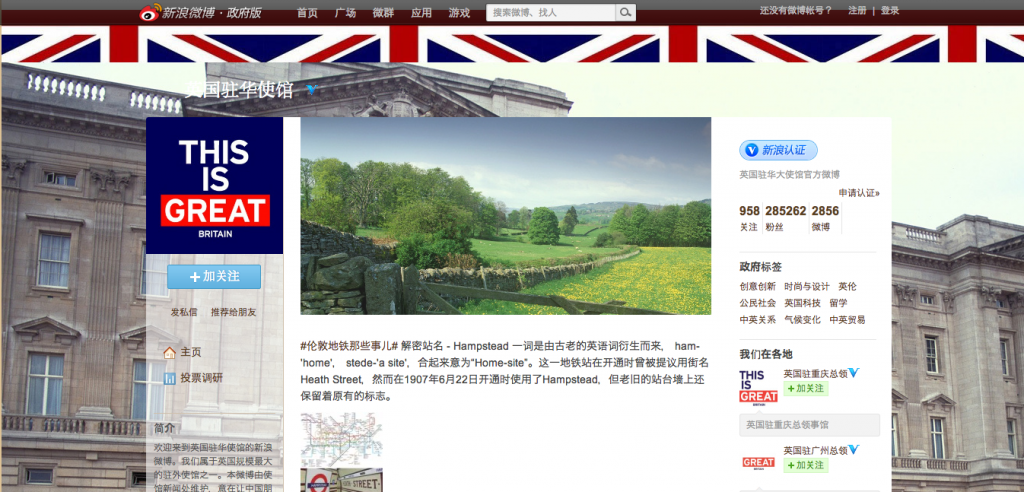30th April 2013 Beijing, China
Tweeting about British culture

Digital diplomacy is undoubtedly an increasingly important aspect of public diplomacy and its popularity is growing fast. It helps us understand our audience better, talk to them directly and make an impact in a more efficient and cost-effective way.
Besides relevant topics about our country objectives – foreign policy, economics, trade, climate change and the GREAT campaigns – from time to time we also introduce British culture to our local Chinese followers on our digital platforms. It’s always easier for people to accept your views and to advance UK interests when they are interested in and familiar with you.
So far, the best digital tool used by our Embassy in Beijing is Weibo (the Chinese Twitter equivalent). In China, Weibo has over 500 million users (almost half the population) and over 290,000 of them are following our Embassy account. We know our audience well, so our tweets are usually very well received. I am proud to say that ‘very well’ often means hundreds of retweets, reaching hundreds of thousands of people.
Last December, we introduced a series of 19 tweets on ‘British Celebrations at Christmas and New Year’. In total, they generated 2885 retweets and 799 comments. Chinese audiences were excited to learn about unknown traditions in British culture. Below is the most popular one, about Christmas pudding, receiving 641 retweets and 107 comments.

We try to link with local hot topics, too. For example, given milk produced in China does not have a decent reputation, we thought it might be interesting if we told some stories about British milk. In the final tweet we published, we explained how different coloured caps represent the different fat percentages of British milk. The tweet was retweeted 286 times (picture below). Many people expressed their interest in drinking British milk, while there were also people who had been to the UK saying that they missed the true taste of milk. The tweet was published when Owen Paterson, Secretary of State DEFRA, was visiting Shanghai and Guangzhou on a business trip during which he was hoping to balance the exports and imports of British dairy products, so the tweets tied in with our prosperity agenda.

 Sometimes our tweets are just fun, like a pumpkin carved to look like the head of our Communications Counsellor or our Ambassador playing the James Bond theme tune on guitar. The former was at Halloween and the latter was a fun add-on to our Skyfall launch activities. Both tweets received over 130 retweets. Our audience laughed about the pumpkin and expressed surprise that, “Halloween isn’t just an American thing”, but some expressed concern about how seniors might respond to our light hearted gesture with one follower noting: “That’s so lovely, but I’m afraid that your boss won’t be happy”.
Sometimes our tweets are just fun, like a pumpkin carved to look like the head of our Communications Counsellor or our Ambassador playing the James Bond theme tune on guitar. The former was at Halloween and the latter was a fun add-on to our Skyfall launch activities. Both tweets received over 130 retweets. Our audience laughed about the pumpkin and expressed surprise that, “Halloween isn’t just an American thing”, but some expressed concern about how seniors might respond to our light hearted gesture with one follower noting: “That’s so lovely, but I’m afraid that your boss won’t be happy”.
We also highlighted how innovative the Queen is. One tweet read:
The Queen was given Bafta award for lifetime support of British film last night. We all remember her performance as herself in the opening ceremony of London 2012 Olympic Games with Daniel Craig. Last Christmas, she also recorded her New Year speech in 3-D.
Netizens responded positively, saying that the Queen was ‘adorable’ and ‘a model of being never too old to learn’. Personal compliments to the Queen aside, this helped to cement an image in people’s minds of the UK as an innovative place, right from the very top.
So, if you want local people to buy in to your opinions and to advance UK interests, you should make yourself interesting and attractive. And if you are in a country where international tools like Youtube, Facebook and Twitter are not accessible (like China), you need to consider local tools. Go to places where your audience are, use the language your audience are using, listen to them, and communicate.